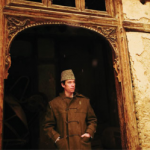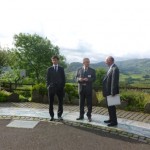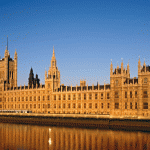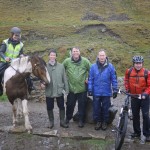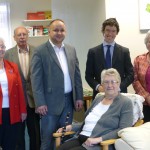Greg Clark, Minister for Decentralisation, grants parish councils more powers
Bradford Trident community councillors (from left): Shahzada Meer, Taj Salam, Munawar Khan and Shah M Khokhar, with council clerk Rebecca Holmes. Photograph: Asadour Guzelian
Shahzada Meer knows everyone and everyone knows him. The community councillor says: “If somebody wants me, they can pull me over and talk to me for an hour. We’re easily approachable so that gives them the feeling that they’ve got an ear.”
Since the Bradford Trident community council was formed last year in the Little Horton ward, Meer and the 11 other councillors who represent the six mini-wards into which the area has been divided have helped residents with everything from finding a builder to complaining about antisocial behaviour and policing, to getting solar panels fitted on new blocks of flats. There have been hiccups. Last month one of the councillors, Ilyas Khan, was convicted of assaulting a traffic warden, and the council is about to move to bi-monthly meetings in the hope of boosting attendance. British-Asian men are over-represented with 10 out of 12 seats, while retired teacher Shah Khokhar says that “some people think now you’re a councillor, you’re responsible for everything.”
Council chair Taj Salam, an elected union official in his day job, says cheerfully that “it is absolutely diabolically annoying. You’ll go to a funeral, and people will say ‘do you remember that thing I raised with you?’ Or you’ll turn up at home and there’s two people sat there already in your house, and your wife has just made a cup of coffee and is looking at you as though you’re going to have your dinner in the dog kennel.” The men, who grew up in Bradford and played cricket together as boys, have at different moments asked themselves: “Do I need this?”
But they want their council to make an impression. While there are 9,000 town and parish councils in England covering a third of the population, in cities they remain a rarity. Since the law was changed in 1997 to allow the creation of new parish councils anywhere in England (except in London, which had to wait until 2007), councils have been established in Leeds and Birmingham as well as Bradford. But these are urban exceptions to a norm that remains closer to The Archers. London does not have any.
All that is set to change. Encouraged by the government’s talk of “localism”, though stressing that their agenda has cross-party support, parish councils have been lobbying for more powers; and the forthcoming localism bill is expected to grant them.
At present, parish councils’ powers can include maintenance of street furniture, management of public toilets, memorials, bus shelters and buildings such as village halls, community and sports centres and museums. They look after allotments, greens and commons, are involved in transport decisions such as road closures, and devote a lot of energy to planning.
A new “general power of competence” will mark a significant shift towards local decision-making in relation to planning, while there are rising expectations that parishes may win new powers to scrutinise local authority spending.
Greg Clark, minister for decentralisation says “parish councils up and down the country would like to have greater influence and [the new legislation] will allow them to do this”. While there will be no formal target he hopes a number of new councils will be formed and is looking forward to “a great revival” of parish politics.
He believes this will include urban areas. “One of the things I expect to follow from these new powers being available is for new arrangements to spring up around neighbourhoods – they may not call themselves parishes, but in essence having a much more local focus than existing borough councils. Most towns and indeed most cities are in truth collections of neighbourhoods that often have very strong identities.”
John Findlay, chief executive of the National Association of Local Councils, says “the more we can parish, the better”. In north London, defeated Liberal Democrat parliamentary candidate Ed Fordham is working on a plan for a cross-borough Kilburn council, while there are also campaigns in Wapping and on the South Bank.
And tonight, in the Queen’s Park ward in north Westminster, in London, where I live, residents will meet to discuss a proposal to turn the neighbourhood forum, funded by central government until its grant was cut this year, into a council. The forum of elected residents was started by Paddington Development Trust (PDT), the social enterprise chosen by Westminster city council to oversee regeneration of the area. It provides employment and health advice, organises an annual festival and fireworks, prints newsletters and works with service providers including the NHS, police, and social landlords.
Civil society minister Nick Hurd visited PDT the day after the general election, and tweeted “Really enjoyed first ministerial visit to Paddington Development Trust. Residents have real sense of ownership & power. Big society in action!!” But weeks later its budget was axed in the first round of cuts, leaving local people facing a difficult decision: whether to wind up the forum, to continue on a purely voluntary basis and without PDT, or to try to turn the forum into a community council.
Forming a new council is, however, a time-consuming business. Sarah Evans, who led the campaign for a town council in Andover, Hampshire, where residents were furious that the borough council had let the Guildhall to a pizza chain, says the first step is to organise a public meeting. Then activists need to knock on doors with a petition, collecting signatures and discussing the issues face to face.
Once 10% of electors have signed the petition, it is sent to the local authority, triggering a governance review that can include a referendum. Candidates are nominated and an election is called.
Getting the necessary support is not always easy. The obvious stumbling block is the precept charged by a parish council and added to the council tax to fund its activities. While precepts are typically just a few pounds a month, it can be hard to persuade people to pay more tax – even if the money is being spent around the corner. In Bradford, organisers backed away from a precept when people reacted badly, and for now their flagship council is funded by the community-led company formed to implement Labour’s New Deal for Communities in the area.
But with the principal authorities that oversee housing, rubbish collection, education and other essential services across the country making cuts and sharing functions or even merging, there are calls for greater neighbourhood organisation. If budgets for libraries, swimming pools and parks are to be cut with unpaid volunteers – the “big society” – expected to step in and take over, there must be a way of holding new service providers to account.
Conservative MP Rory Stewart, who chairs an all-party group on local democracy, and deals with 105 parish councils in his Cumbrian Penrith constituency, says these ultra-local councils are “vital” if the government’s decentralisation agenda is to work. “If the big society is about something distinctive, it is about local democracy,” he says. “It’s about communities organising themselves and if government is going to interact with those communities and make assets available to them, those communities need a degree of legitimacy.”
Advocates believe parish councils enhance democracy, as well as accountability. Elections are often timed to coincide with other local elections. There is a tradition of putting aside party politics, but some candidates will stand on a party ticket as in any other election.
“You are much more in touch with your electorate because of the size of the area you are representing. What people want to see is that you can make a difference to their lives,” says former Labour MP David Drew, a parish councillor for 24 years in Stonehouse, Stroud in Gloucestershire.
Fordham says “every planning decision made locally is better than a decision made far away”, and that community politics offers a way for people turned off by party politics to get involved.
But the transfer of assets from principal authorities to community councils also presents challenges. Clearly, there needs to be careful oversight of any negotiation between a big authority with a professional finance director whose job is to offload costs, and a group of enthusiasts who fancy running the youth club.
Findlay says the devolution of services without accompanying budgets is a “big problem” for parish councils. And they seem unlikely to catch on in Labour-voting urban areas if people see them as providing cover for a shrinking state.
There is a danger of nimbyism too, for example with objections to the building of new homes. “Parish councils have a responsibility to think about things that happen outside their parish boundaries and to think about the minorities within them,” says Stewart. “Democracy is not supposed to be about selfish majoritarian interests.”
But one of the biggest attractions of parish councils is their size. As a parish ward usually contains fewer than 2,000 people, councillors can actually know most constituents. The Bradford Trident councillors believe that having someone to talk to is the “missing link”, and that people feel better for having had a conversation even if they can’t help.
“Sometimes there’s a big gap between expectations and what we can deliver,” says Meer in Bradford, “but you couldn’t get a better example of the big society than us.”





